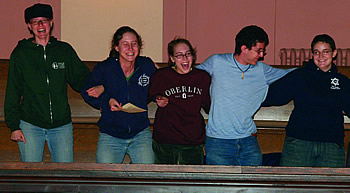|
Issue Contents :: Feature :: Things That Go Pump in the Night :: [ 1 2 ]
He’s probably right, as he continues to explain. “In a lot of ways, our instrument is under attack, from budget cuts to declining congregations. It’s important to show the generation that will be running things in 10 or 20 years that we’re relevant. The more people we can show now, the better off we’ll be in the long run. I’d like to get even more people interested before I leave.”
|
Entering their 14th year, midnight Organ Pumps draw a late-night crowd in search of unusual, yet
quality, entertainment. Junior organ major David Crean was the host of the 2005 Halloween Pump, which featured student performances of Bach’s Toccata in D Minor and a movement from Mendeslssohn’s
F-Minor Sonata. |
David Boe, 40-year professor of organ at Oberlin, says the student-run pumps offer great real-world training for Oberlin’s 30 organ majors, most of whom will eventually find their way into teaching or church positions. “It’s good experience in terms of attracting an audience, organizing an event, being able to stand up in front of an audience, and creating a sense of excitement and enthusiasm,” he says.
“The Organ Pump provides our students with a terrific performance outlet, while proving that great music is sought after—even after midnight,” adds Dean of the Conservatory David Stull ’89. “It also allows our students to be creative in their approach and encourages a nice blend of humor and solid repertoire.”
The immediate goal, of course, is to keep ’em coming. Future events include a Valentine’s Day Pump, a Game Show Pump, and a Holiday Pump focused on the tiny volume of organ music written by Beethoven.
Crean’s predecessors are smiling. One of them, in fact, Erik Suter ’95, admits he’s “blown away” by the success of the Friday Night Organ Pump. Suter, the organist and associate director of music at the Washington National Cathedral, was among the three Obies who co-founded the Organ Pump in 1992. His fellow conspirators included Bruce Frank ’93, a performer and instructor in organ and music theory at the Loyola College of Music, and Michael Lizotte ’93, music director and organist at St. George Church in Worcester, Massachusetts.
Suter says the pump’s founders had a few highly specific targets. “For one thing, we were trying to come up with more performance opportunities; four standard recitals aren’t exactly a lot over four years. Also, the organ is often perceived solely as a church instrument, and we wanted to present all the music that’s outside the sacred context. We had lots of enthusiasm, as you do when you’re living in rural northern Ohio.”
The founders were equally serious about having fun; during one of the early events, they lined the pipes of the old Skinner organ with flour that would emit puffy white clouds when sounded. They chose the term “pump” because they wanted a risqué title, “something to intrigue people,” Suter says.
Crean elaborates. “In this context, the term ‘pump’ refers to the after-hours social aspect of it and to the fact that pipe organs once had to be pumped manually. It’s probably not very widely understood by our audience.”
 Why midnight? That, too, was a strategic decision. Not only was it an unusual time for a concert, but it also allowed students to leave the pump and head straight to the ’Sco, which stopped charging a cover fee at 12:30 a.m. during Suter’s days. Why midnight? That, too, was a strategic decision. Not only was it an unusual time for a concert, but it also allowed students to leave the pump and head straight to the ’Sco, which stopped charging a cover fee at 12:30 a.m. during Suter’s days.
In the years since Suter graduated, his creation has evolved into a fully functioning organization complete with elected officials and a web site with downloadable recordings. The only thing that hasn’t changed, he says, is the group’s commitment to the music.
“We didn’t want it to be a stodgy or even typical experience in any way. There had to be something entertaining about it, if it was going to work. But we insisted that the performances themselves be of the highest quality possible.”
It’s 12:30 a.m. and the Halloween Organ Pump is nearly over. Most of the students rush forward out of the pews, jockeying for a position on the stage as Jonathan Bezdegian ’07 plays a toccata by Louis Vierne in the decidedly spooky key of B-flat minor. The sight would mystify an outsider, but Organ Pump veterans know exactly what they’re doing.
“You can always feel the vibrations on the floor really well,” Suter explains. “This is what led to the tradition of every pump starting with someone running down the aisle toward the stage. You really have to be there to appreciate it.”
Zachary Lewis is a freelance arts journalist in Cleveland.
|





